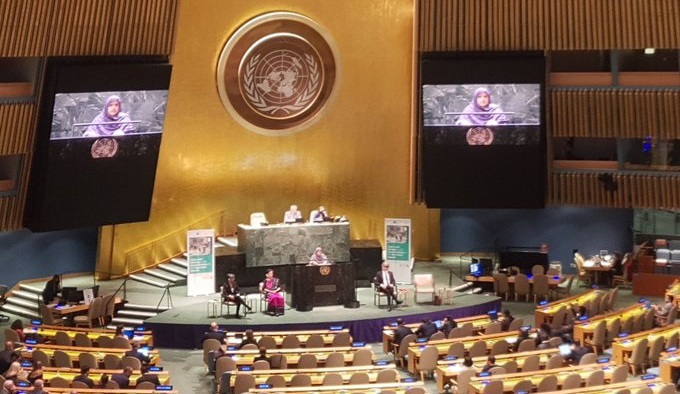III WORLD URBAN FORUM
RETURN TO
BETWEEN PENDING COMMITMENTS
AND NEW IDEAS AND SOCIAL PRACTICES
Speech by Enrique Ortiz
President of Habitat International Coalition (HIC)
to the Plenary Open Session
June 19, 2006
Thirty years have passed since the first UN Conference on Human Settlements. Habitat I was not only a vibrant and creative encounter, it also constituted a significant milestone in worldwide awareness of the grave habitat problems in both the countryside and the city, of possible strategies to address them, and of the role the different actors could fulfill.
The habitat issue was analyzed in its entirety. Orienting principles and action guidelines were established for governments, as well as international cooperation and national action criteria, and recommendations regarding policies, strategies, planning, and institutional administration of human settlements.
Habitat I profoundly addressed the land issue and outlined the role of popular participation in human habitat production and management processes.
The Vancouver Declaration, signed by the governments, recognized that “housing and adequate services constitute a basic human right which imposes on governments the obligation to assure their obtainment by all inhabitants.”
Thirty years after this founding encounter, which would inspire the implementation of multiple governmental programs and innovative social experiences across the planet, we now find ourselves amidst a panorama of imposition of reductionary and market-dominated trends, contrary in many senses to the spirit of Vancouver ’76.
The dream of the International Year of Shelter for the Homeless (1987) was to facilitate adequate housing for all by the year 2000, goal frustrated by the imposition of policies that conceive housing as mere merchandise, the city as sphere of financial and real estate speculation, and common and limited goods —land and water— in terms of scarce products subject to free market rules. The result is that the numbers of homeless and precariously-sheltered world inhabitants continue to escalate.
The city has come to be considered as motor of development. Habitat II forgot the countryside and became the Cities Summit. Fulfillment of the Habitat Agenda, given governmental disinterest and economic pressures, was reduced to two campaigns: security of tenure, and urban governance.
In housing matters, the governments, pressured by the multilateral financial institutions and powerful economic interests, will prioritize the strategy to “facilitate operation of the housing markets,” forgetting that other complementary strategy contained in the Habitat Agenda, to “facilitate housing production by communities.” Oversight which has cancelled supports, and classified the organized and autonomous social efforts in non-profit habitat production and management as subnormal, informal, irregular, and even illegal.
The limited commitment demonstrated to implement the Habitat Agenda contributed to a new decline of its responsibilities upon establishment of the millennium goals in the year 2000. Reduction by the year 2020 of the number of slum dwellers by 100 million constitutes a clearly insufficient goal if we take into account that 1 billion people live in slums today and the trend indicates an increase of 600 million more by 2020. But even this limited goal faces the disinterest of many countries and powerful actors to promote its fulfillment.
Massive evictions in Asia, generalized precarious habitat conditions in Africa, privatization and loss of social housing in Europe and North America, massive emigration of the indigenous and poor rural population toward countries of the North and cancellation of supports for organized efforts of the urban poor in Latin America, are some of the most serious and visible consequences of these trends.
In contrast, and as creative reaction to these facts, self-managed experiences emerge and multiply in many parts of the world, driven by poor inhabitants —with the support of NGOs, professionals and academics— capable of producing and managing not only housing but organized communities and the city itself, while also building active and responsible citizenship.
They do so while facing innumerable obstacles and limitations. Many of these heroic experiences are recognized and rewarded by the United Nations and other entities as “best practices.” That’s good progress! But today it is also time to reward best policies.
The world has become more complex, and is experiencing profound changes in ideas, technology, and modes of production. We can not confront the habitat issues of the 21st Century with the same ideas, concepts, policies and instruments that contributed in the recent past to deepen those problems. And not through partial, isolated, homogenizing, or linear solutions, nor those focused on a small few.
The future sustainability of human habitat can not be limited to achievement of a few competitive global cities, nor the financial viability of real estate ventures. It depends in large part on democratic and equitable distribution, and responsible and careful use of economic and natural resources, coupled with social, political and cultural viability of the actions we pursue. It is not a mere market problem. It necessarily implies the intervention of the States and participation at the highest possible level of organized society.
We need a complex approach which implies renewed evaluation of the rural-urban relationship, advanced recognition, defense and progressive realization of the whole of habitat-related human rights, and establishment of coherent policies and systems of instruments appropriate to the diverse forms of production, administration, and governance of human conglomerates.
Our return to Vancouver, with the enormous baggage of 30 years of accumulated positive experiences and frustrating failures, should be occasion to seriously debate new inclusive ideas, which according to the United Nations invitation to this Forum, we should convert into actions in the immediate future.
UN-Habitat has established numerous formal agreements with municipal governments and the private sector. Today it is time to build a vigorous partnership with the organized civil society that struggles throughout the world to realize the rights of all persons to a secure place in which to live in peace and with dignity.
HIC and other international networks with which we work are willing to be part of this initiative.
Thank you.


